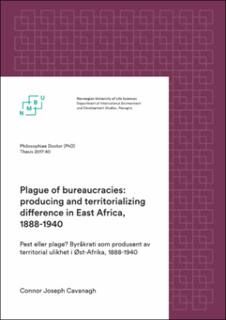| dc.contributor.advisor | Benjaminsen, Tor Arve | |
| dc.contributor.advisor | Vedeld, Pål Olav | |
| dc.contributor.author | Cavanagh, Connor Joseph | |
| dc.coverage.spatial | Africa | en_US |
| dc.date.accessioned | 2020-03-02T12:16:08Z | |
| dc.date.available | 2020-03-02T12:16:08Z | |
| dc.date.issued | 2017 | |
| dc.identifier.isbn | 978-82-575-1441-9 | |
| dc.identifier.issn | 1894-6402 | |
| dc.identifier.uri | https://hdl.handle.net/11250/2644639 | |
| dc.description.abstract | Mahmood Mamdani (1996a: 8) once provocatively argued that “apartheid, usually considered unique to South Africa, is actually the generic form of the colonial state in Africa.” The research objective of this dissertation is to examine Mamdani’s argument in relation to what are now the contemporary states of Uganda and Kenya, but also to trouble us about it for three reasons: one historiographical, one geographical, and one ecological. To fulfil this objective, the dissertation utilizes the methodology of historiographical political ecology (Part I). I have developed and practiced this methodology through archival research at the ‘national archives’ of Kenya (the Kenya National Archives in Nairobi, Nakuru, and Kakamega) and the United Kingdom (The National Archives, Kew, and the British Library, London), as well as via a recursive engagement with the historiographical archive. | en_US |
| dc.description.abstract | Mahmood Mamdani (1996a: 8) kom en gang med det provoserende argumentet om at «apartheid, som vanligvis anses som en unik styringsform for Sør-Afrika, faktisk er en mer allmenn form for kolonialisme i Afrika.» Målsettingen for denne avhandlingen er å se Mamdanis argument i sammenheng med de moderne statene Uganda og Kenya, men også å problematisere dette av tre ulike grunner: én historiografisk, én geografisk og én økologisk. I avhandlingen
benyttes metoden historiografisk politisk økologi (del 1) for å nå denne målsettingen. Jeg har utviklet og praktisert denne metoden ved å forske i nasjonalarkivene i Kenya (Kenya National Archives i Nairobi, Nakuru og Kakamega) og i Storbritannia (The National Archives i Kew og British Library i London). | en_US |
| dc.description.sponsorship | Social Sciences and Humanities Research Council of Canada (SSHRC) ; Research Council of Norway ; Nordic Africa Institute ; World Agroforestry Centre | en_US |
| dc.language.iso | eng | en_US |
| dc.publisher | Norwegian University of Life Sciences, Ås | en_US |
| dc.relation.ispartofseries | PhD Thesis;2017:40 | |
| dc.rights | Attribution-NonCommercial-NoDerivatives 4.0 Internasjonal | * |
| dc.rights.uri | http://creativecommons.org/licenses/by-nc-nd/4.0/deed.no | * |
| dc.title | Plague of bureaucracies : producing and territorializing difference in East Africa, 1888-1940 | en_US |
| dc.title.alternative | Pest eller plage? : byråkrati som produsent av territorial ulikhet i Øst-Afrika, 1888-1940 | en_US |
| dc.type | Doctoral thesis | en_US |

